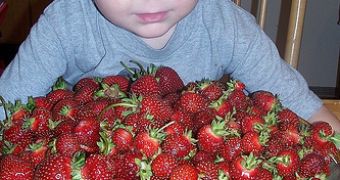A recent study carried out by researchers at Telemark University College, Norway and the Norwegian Institute of Public Health, found that overweight kids ate healthier food than normal weight children, but the quantities were not well adjusted.
Overweight children taking part at this study, reported frequently eating healthy foods such as fruit, vegetables, fish, brown bread and potatoes as well as low-energy cheese and yoghurt, and they actually ate better than normal weight children did.
The eating-habits study included 924 fourth graders, 9 to 10 years old, from the Telemarkt county.
Back in 2007, when the study was carried out, the participating kids represented nearly half of all fourth graders in the Telemarkt.
Follow-ups with new measurements and questions were conducted in 2010, and the new results are currently being analyzed.
The kids eating habits were evaluated by asking how often they ate a variety of foods, whether it was for meals or for snacks, and this method allowed the researchers to find eating patterns that show what foods are eaten together.
At school, public health nurses measured and weighed the kids, and the children's parents too had to take part at the survey.
They were asked their own weight, education and occupation besides their children's eating habits and activity level.
The study results showed that overweight kids drank juice and artificially sweetened soft drinks more often than normal weight children, who drank carbonated drinks and ate unhealthy and processed foods like burgers, sausages, biscuits, processed pizza and sweets.
In the case of an overweight child, both parents and the child are aware of food choices, concluded the study, but it also showed that overweight kids are not as physically active as others, and also are more likely to have obese parents, than normal weight children.
Researcher Anne Lise Brantsæter at the NIPH, said “it is positive that parents and children emphasize healthy food choices.
“However, it is important to note that the amount of healthy foods must be adapted to a child's activity level to limit further weight gain.
“Obesity is a growing problem that can have unfortunate consequences for the children both physically and mentally.
“There are many contributing factors to obesity and it is important that both parents and children are given good guidance and support early on,” Brantsæter added.

 14 DAY TRIAL //
14 DAY TRIAL //